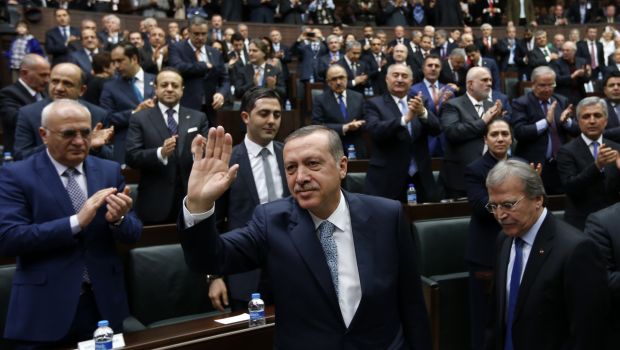
Turkey’s Prime Minister Tayyip Erdogan greets his supporters as he arrives for a meeting at the Turkish parliament in Ankara February 25, 2014. (Reuters/Umit Bektas)
Istanbul, Asharq Al-Awsat—Turkey’s parliament has approved the closure of private preparatory schools run by US-based Turkish Islamist preacher Fethullah Gülen’s movement, Hizmet, in the latest development of the ongoing feud between the movement and Turkey’s ruling Justice and Development Party (AKP).
The proposal of the bill for the closure of the schools last summer was one of the main catalysts for tensions between the AKP, led by Turkish Prime Minister Tayyip Reccep Erdoğan, and Gülen’s movement erupting into the open.
The schools prepare students to enter universities and official Turkish high schools, both of which offer a limited number of places that are contested by thousands of students. The fees charged by the schools are one of the movement’s biggest sources of revenue.
An official Turkish source said these schools deprived Turkish citizens of “equal opportunity,” giving students from rich and influential families the opportunity to enter universities and hold higher posts in the state and its institutions at the expense of people with limited resources.
The source, speaking on condition of anonymity, told Asharq Al-Awsat that there were also “political reasons” behind the closures. He said the Gülen group gave free admission to children of individuals it wanted to place in senior positions in private and public institutions, in order to secure their loyalty.
He added that recent events confirmed this fact, in an indirect reference to government accusations that Gülen’s influence had reached the police and judiciary, and that Gülen was behind the events of December 17, 2013, when the sons of senior state officials were arrested as part of a corruption probe, including some individuals close to Prime Minister Erdoğan.
The law, which orders the closure of schools before September 2015, was passed by Turkish lawmakers late on Friday night. Opposition MPs objected but were unable to stop its ratification because of the outright majority enjoyed by Erdoğan’s AKP.
Turkish writer and political analyst Mustafa Ozcan said the ratification of the law was akin to the “declaration of an all-out war on Gülen.”
The draft law comes as a culmination of a wide campaign launched by Erdoğan to reduce the influence of the Gülen group by ratifying a law to govern the work of the judiciary, where Gülen is thought to have great influence.
He also ordered the transfers of many members of the police force, mainly supporters of the Islamist preacher, and introduced a law to monitor Internet traffic in order to stop leaks, of which the Gülen group is accused of causing, most recently the audio recording alleged to be of a conversation between Erdoğan and his son, which suggested involvement in corruption, and which Erdoğan said was a “fabrication.”
Ozcan said there was a state of instability in the country as a result of this open war between the two sides, the end of which could not be predicted. He added that public opinion was largely with the government, but that the group was an effective force in government, and that either side could eventually triumph over its rival.
Melda Onur, an MP for the opposition Republican Party (CHP), said the reason for presenting the legislative changes dossier to the Higher Judicial Council and its ratification by parliament is the government’s fear of the judiciary, which could open an investigation into dozens of corruption files in which ministers and MPs, and even the head of the government, could be involved.
Onur dismissed the government and it supporters’ claim of the existence of a “parallel state,” adding that those they accuse of conspiring against them have been their partners in government for 12 years.
She added that the government knew its rivals had evidence against them, and therefore it was trying to gain total control of the judiciary by issuing a new law to restructure the Higher Judicial Council and the state prosecutor’s office to place them under direct government supervision.
Onur dismissed the chances of Turkish President Abdullah Gül refusing to sign the new law, pointing to his willingness to sign two previous controversial pieces of legislation.
She said: “Everyone knows that the office of the president of the state . . . becomes a notary office for the government which controls the parliamentary majority, but I think that President Gül would not be exactly like that, because he is a man with a worldview that is much broader than that of the members of government, because those laws will place Turkey on the list of states ruled by dictators.”
Yasin Aktay, an MP for the ruling AKP, said that what the government wanted from the change of the council law was to pull the rug from under the feet of “those who turned the judiciary into a puppet which is moved from outside the country,” and which served the interests of a small minority of people.
Aktay told Asharq Al-Awsat: “Our aim is to turn the judiciary into an institution which serves all people fairly, regardless of their sectarian background, but the opposition uses the same method it used 12 years ago, which is to oppose for the sake of opposing.”
Aktay added: “The government will not stop fighting the structures which are parallel to the government, not today and not after March 30—the date of municipal elections—and the war on these structures will continue until we dry up their resources. We will not allow any group to run the state according to its wishes or interests, and if they wanted to run the country, they are welcome to establish a political party and enter the elections in the recognized democratic way, and if they win, congratulations to them.”
Meanwhile, the head of the AKP in parliament, Mustafa Ali Taş, announced the postponement of the session to discuss a bill to expand the powers and responsibilities of the intelligence services until after the municipal elections.
